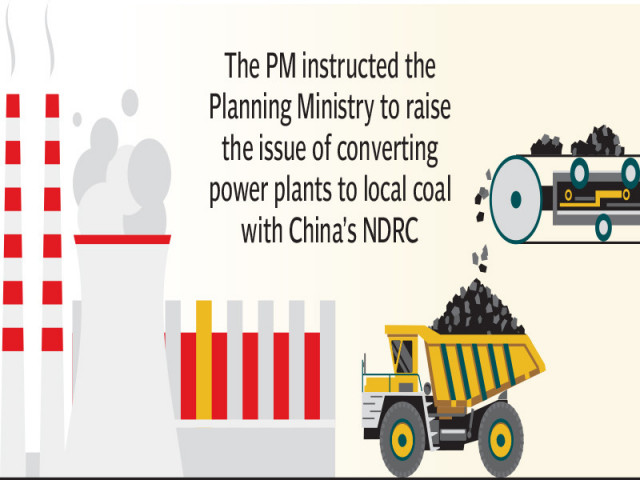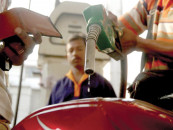‘All plants to shift to local coal’
PM says move will save $800m; okays WACOG resulting in 41% gas price hike

Pakistan decided on Monday to convert all imported coal-fired power plants to local coal, including three Chinese plants. The aim is to save $800 million annually on coal prices and reduce end-consumer rates by about Rs3 per unit.
The decision was made in a meeting chaired by Prime Minister Shehbaz Sharif, who also approved implementing the Weighted Average Cost of Gas (WACOG) formula. This move would result in another 41% increase in gas prices, raising average prices from Rs1,597 per unit to over Rs2,250.
While this decision would raise end-consumer prices, it would accurately reflect the actual gas price due to the increasing share of imported gas.
According to the formula, end-consumer prices would be based on the average price of imported and local gas. Costs associated with gas production and procurement would be summed up based on the percentage contribution of each source.
The regulated price is low compared to imported Re-gasified Liquefied Natural Gas (RLNG) rates, contributing to the gas sector’s circular debt, which has reached Rs2.9 trillion. The government has previously passed on the impact of imported gas to a greater degree, but with full WACOG implementation, piped-gas prices will surge again.
The federal government has increased gas prices three times in the past year, pushing prices for certain categories close to or even higher than imported gas prices.
The PM has instructed the Petroleum Division to provide another briefing on the implications of implementing the weighted average price of local and imported gas after one week. Pakistan’s local gas reserves are depleting at a rate of 7% to 8% per annum, leaving little reserves by 2035.
Petroleum Minister Dr Musadiq Malik proposed implementing the national WACOG formula, which would increase gas prices for some discoveries. However, the overall increase in prices would be around 28% instead of 41%.
The PM called for measures to reduce electricity prices and decided to shift coal-fired power plants from imported fuel to local coal.
There are at least five major imported coal-fired power plants with a total capacity of 5,940 megawatts. These include three Chinese-owned plants in Sahiwal, Port Qasim, and Hub with a total capacity of 3,960 MW. Another Chinese plant of 300 MW, planned for Gwadar, is on hold due to disagreements over size, location, and fuel type.
According to sources, the PM instructed the Planning Ministry to raise the issue of converting Chinese power plants to local coal with China’s National Development and Reform Commission (NDRC). This matter will also be discussed at the Joint Cooperation Committee (JCC) of the China-Pakistan Economic Corridor (CPEC).
Pakistani authorities estimate that converting these power plants to local fuel would save $800 million annually and reduce electricity prices by Rs3 per unit.
However, convincing foreign investors to change their power plants’ technology and fuel may take years.
One 1,320MW Jamshoro power plant is funded by the Asian Development Bank, while another 660MW project is owned by the Lucky Group. An investment of about $480 million is needed to expand the Thar coal mine to produce enough coal for these power plants.
The government may need to make extra efforts to convince Chinese investors, who are already facing problems due to non-payment of Rs487 billion in dues for power sold to Pakistan.
Over the past 16 months, Chinese power plants billed Rs1.6 trillion for energy sales, but only Rs1.3 trillion (80% of the invoices) was cleared by Pakistani authorities. Pakistan is contractually obligated to make 100% payments to Chinese plants to prevent them from entering the circular debt cycle.
A major surge in CPEC circular debt occurred during the interim government period, which failed to make timely payments. For example, in January, the caretaker government paid only Rs58 billion to Chinese power plants, compared to monthly invoices of Rs110 billion.
During Monday’s meeting, the prime minister also directed that only clean, cost-effective, and renewable power plants should be established in the future.
According to the Prime Minister’s Office, it was also decided to retire or auction fuel-guzzling government-owned power generation companies (GENCOs). The PM instructed the Power Division to prepare a plan either to offer golden handshake packages to these companies’ employees or to absorb them elsewhere.
The Privatisation Ministry was instructed to prepare a plan to sell the land of power generation companies that would be shut down, according to the decision.
Earlier, the National Electric Power Regulatory Authority (Nepra) in its ‘State of the Industry Report 2023’ noted that the high electricity rates in the country was one of the main factors affecting the country’s economic development and the decline in its GDP.
The report noted that this price escalation emanated primarily because of increase in the prices of essential primary energy resources including coal, oil, and gas in the international market and drastic devaluation of the local currency, which intensified the financial strain on the power sector and consumers
“Pakistan heavily relies on imported energy resources such as coal, oil and gas. The devaluation of the rupee leads to higher import costs, directly influencing the pricing of electricity and resulting in increased tariffs for consumers. Moreover, the power sector is heavily dependent on imported equipment and technology. A devalued rupee further amplifies the cost of such imports, making it more expensive to maintain and upgrade power infrastructure.”
It was noted in the report that from an economic perspective, nuclear and Thar coal-based plants stood as the most viable options for base load power.
Published in The Express Tribune, April 16th, 2024.
Like Business on Facebook, follow @TribuneBiz on Twitter to stay informed and join in the conversation.



















COMMENTS
Comments are moderated and generally will be posted if they are on-topic and not abusive.
For more information, please see our Comments FAQ